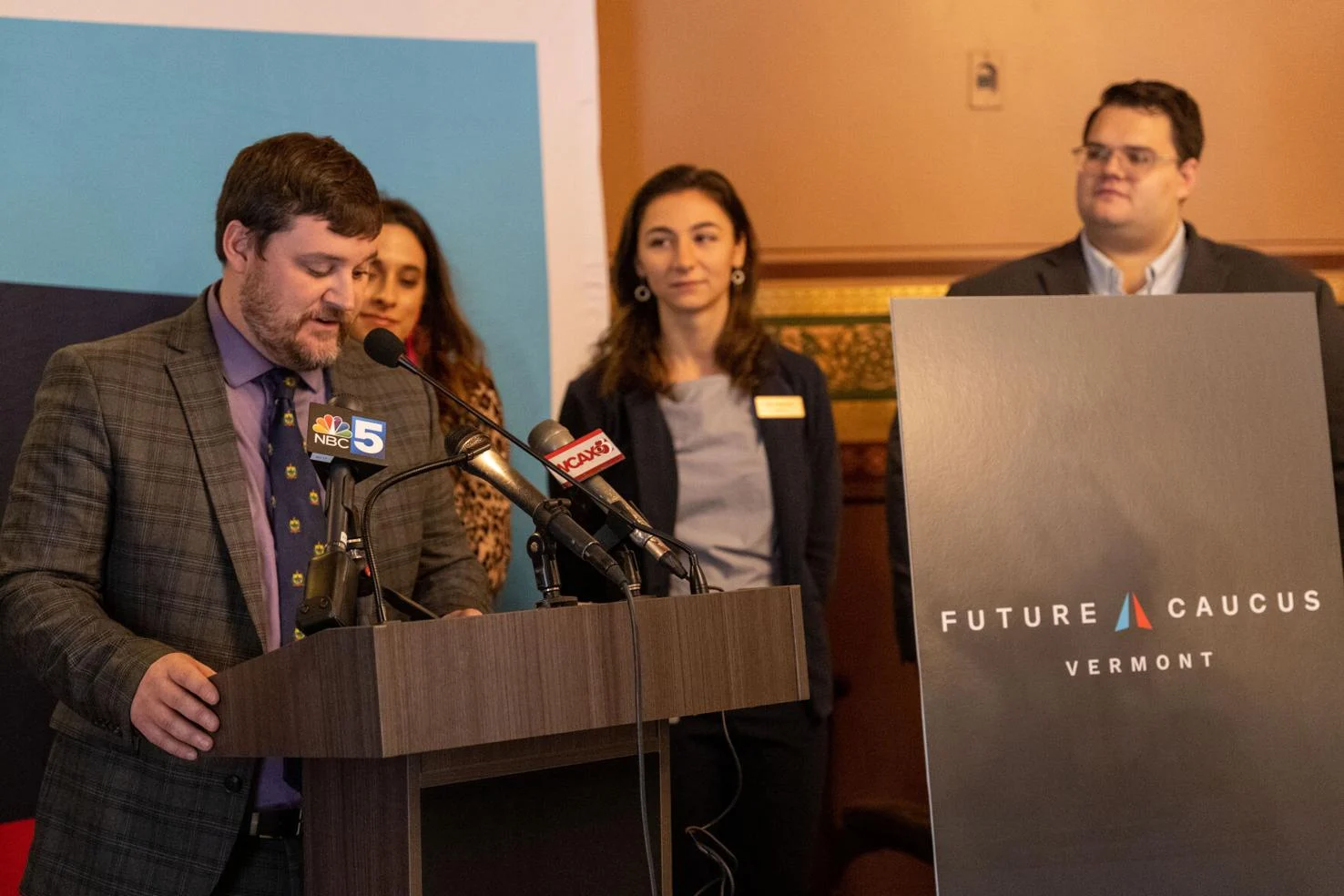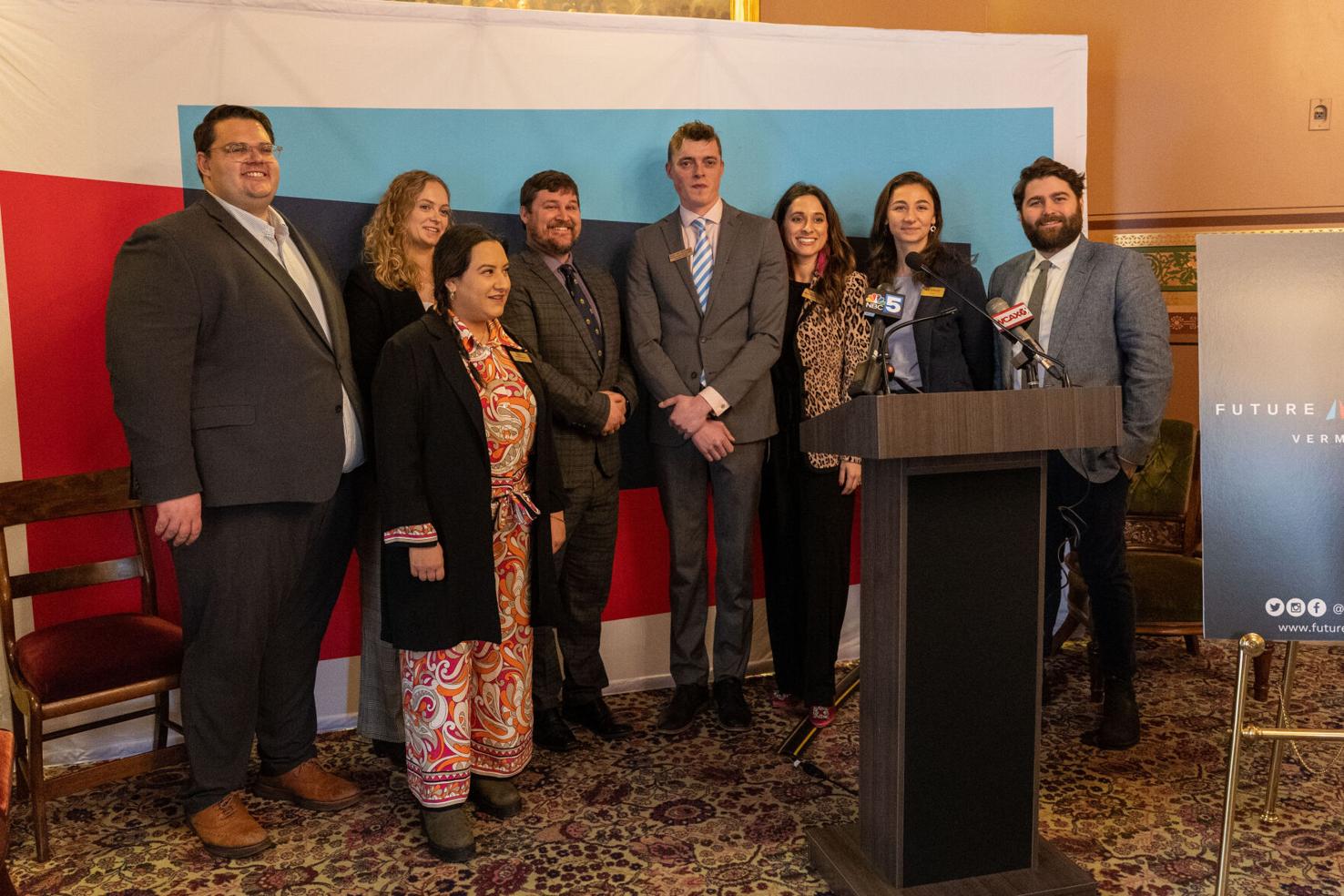Who speaks for young people in Montpelier? Vermont Future Caucus looks to inspire change
January 12, 2024
Bridget Higdon | Saint Albans Messenger
Published on Jan 12, 2024

MONTPELIER — In aging Vermont, who speaks for young people in the People’s House?
This legislative session, the Vermont Future Caucus is aiming to bring the experiences and needs of Gen Z-ers and Millennials to the floor of the Vermont Statehouse.
Rep. Casey Toof (R-St. Albans Town) and Rep. Mary-Katherine Stone (D/P-Burlington), may seem like an unlikely duo on paper, but the two are co-chairing this group of legislators with a shared vision.
“We believe these next generations hold the key to translating innovative policy solutions through our shared generational identity,” Stone told members of the press on Tuesday.
Vermonters aged 18-40 made up about 28% of the state’s population in 2022, according to U.S. Census Data. Toof said there are 38 Gen Z and Millennial legislators in Vermont, making up 21% of the state legislature.
Many of them are involved in the Future Caucus, which is backed by a national nonprofit of the same name. The group seeks to bridge the partisan divide and engage the next generation of policymakers.
“I can honestly say this is the best organization I have ever been a part of during my time in political office.”
—Rep. Casey Toof (R-St. Albans Town)
At a press conference on Tuesday, caucus member Rep. Jay Hooper (D-Randolph) said the Vermont caucus hopes to become a strong voting block on issues impacting young people.
While the caucus’ first official meeting of 2024 is set for Jan. 17, its members already have some ideas for its priorities, including housing, childcare and criminal justice reform.
“I am proud of the great strides that we have made and the steps we plan to take when it comes to discussing and problem-solving hard issues. And goodness knows this brave little state has an abundance of those,” Stone said.
The first step though, will be getting more senior legislators to take them seriously. Many members of the caucus are in their first term and still navigating the processes and unwritten rules of the statehouse.
“One difficulty we have here as young people is an immediate assumption that we don’t know quite as much as those who are older than us,” Rep. Esme Cole (D-White River Junction) said. “It takes a little more endurance to prove we deserve a seat at the table.”
Developing priorities
That time at the table is crucial, because the Vermont Future Caucus is made up of legislators who have lived experiences relatable to many working-age Vermonters.
Of the five members present for Tuesday’s press conference, two said they were renters. One works two other jobs. Rep. Emilie Krasnow (D-South Burlington) called people her age the “sandwich generation,” as they are both caring for young children and aging parents.
“I think it’s really important to have legislators who are living the exact policies that we’re trying to work on,” she said.
Cole is passionate about making it possible for more people her age to run for public office. She knows from experience it’s difficult to be a legislator because of the size of the stipend and lack of healthcare coverage.
“It requires privilege to serve here,” she said. “It’s not accessible for everyone as it stands today.”
To encourage more political participation by young people, Krasnow said she runs voter registration drives at local high schools and prods that generation to volunteer in their community.

In addition to recruiting that next generation, the Future Caucus has decided to also take up criminal justice reform as a key focus. The group is already working on a bill that would shorten offenders’ prison sentences if they take educational classes while incarcerated.
A similar bill was recently passed in Colorado, and its success inspired Vermont legislators to give it a go.
Building bi-partisan friendships
Back in December, the Vermont Future Caucus received the Cherisse Eatmon Collective Impact Award from the national future caucus for its focus on “leadership and political bridge-building.”
Toof and Stone traveled to Washington D.C. to accept the award and came back energized to continue that bi-partisan work.
“I can honestly say this is the best organization I have ever been a part of during my time in political office,” Toof said.
The two sit on opposite sides of the political spectrum. Stone is a progressive, queer Arab American woman from Burlington, while Toof was born and raised in Franklin County, one of the state’s last Republican strongholds.
Despite their differences, their collaboration offers hope for the future of American politics, which at present seems more divided than ever.
Toof said he and Stone often have opposing views on bills, but they still are able to listen to one another respectfully.
“We can have a conversation about it without drawing a line in the sand and sticking our feet in and saying ‘you’re wrong,’” Toof said.
In addition to co-chairing the Future Caucus, the two sit together on the House Education Committee, where they often challenge each other.
“She has no problem calling me out if I’m not doing something as a leader that I should be doing,” Toof said. “Her criticism is constructive.”
“And Casey gives me the confidence to not sit around and wait for things to happen,” Stone said. “There’s no harm in raising your voice and trying.”






Join 1,900+ BIPARTISAN LEADERS NATIONWIDE
Be a part of a network of lawmakers committed to governing effectively, passing more representative public policy, and increasing public trust in democracy.